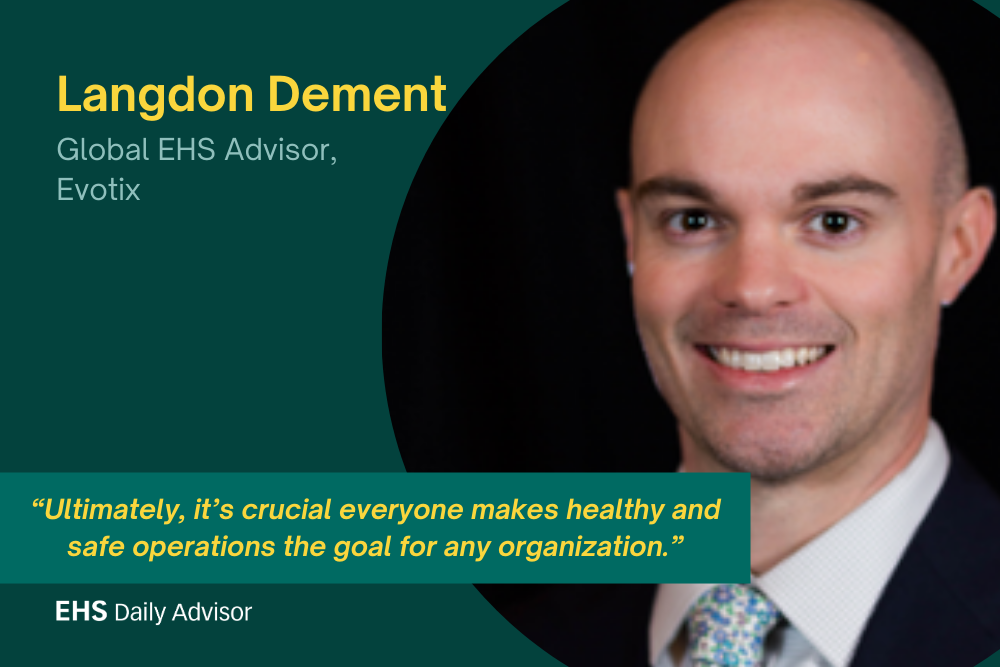Langdon Dement, a long-time safety professional and the global EHS advisor for Evotix, said he doesn’t like the term “safety culture.” According to him, “It seems unrealistic to prioritize safety as the core of an organization’s culture. Instead, a learning culture is more reasonable and applicable to the organization as a whole.”
Dement continued, “Ultimately, it’s crucial everyone makes healthy and safe operations the goal for any organization. When health and safety is constantly discussed, made relevant, and shown to be valuable, any company will progress in maturity. From an organizational maturity standpoint, the most important thing you can do is remain introspective of where you are and where you want to be. Then, the value of EHS will become more apparent.”
As the global EHS advisor for Evotix, Dement helps organizations on their EHS journey. Evotix is an environment, health, safety, and sustainability (EHS&S) software company for midsize and enterprise markets. Dement provides insights for Evotix’s health and safety management systems, offers thought leadership to organizations around the world, and works with various industries to create and maintain health and safety processes, among other responsibilities. He is also the co-host of the company’s “Two Bald Guys Talking Safety” podcast.
With over 14 years of industry experience, Dement is a certified safety professional and an associate ergonomics practitioner. He is a member of the American Society of Safety Professionals and the American Industrial Hygiene Association. Dement has presented nationally and internationally on culture transformation and the importance of incident management and job hazard analysis. He earned his master’s degree in occupational health and safety (OHS) from Murray State University and a bachelor’s degree in biology from Harding University.
To learn more about Dement and his take on other industry issues, please read the Faces of EHS interview below:
Q: How did you get your start in the field?
While earning my bachelor’s degree, I worked with an industrial hygienist friend of mine and really enjoyed the type of work we were doing. He suggested I speak to the master’s OHS program at Murray State University, and the rest is history. Here we are.
Q: What’s your favorite and least favorite part about working in the industry? Would you change anything?
I love helping people and establishing camaraderie with everyone. EHS is a fantastic profession because it provides a platform to help people and organizations. You don’t always get the “glory or recognition,” but knowing you can make a difference in people’s lives is rewarding.
My least favorite aspect is the pushback or lack of commitment that EHS often receives. It’s unfortunate, and while I understand the reasons in some cases, I believe if we could align on a common goal, the benefits of EHS would be clear to any organization and individual.
Q: What will be the impact of environmental, social, and governance (ESG) principles on the EHS industry?
Honestly, this is a tough one. A good sustainable business understands the role of EHS and the importance of keeping the company and people healthy, safe, and protected. Likewise, EHS leaders must understand the integration and importance of ESG and EHS. Good business is about more than just the typical EHS we think about, and in my opinion, that’s where ESG comes into play.
Q: How will new safety technologies influence the work being done by EHS professionals?
Technology, especially when used effectively, will only help EHS professionals and employees alike. Technology provides an efficient means of refinement for many organizational processes we have to manage. The more we as EHS professionals are willing to think differently and avoid the typical mindset rut, the better off we will be.
Q: What are you most proud of?
The connections I’ve made in the field and hopefully the imprint I’ve left with various organizations. I love helping people and love how EHS plays a role in that. I have very much made it my goal to help people get home healthy and safe, just as they have arrived at work.
Q: Do you have any advice for people entering the profession?
Establish camaraderie with everyone! Also, ask questions and don’t be afraid to use your resources. Good EHS is about getting to know others and identifying various ways of helping everyone, no matter the situation.
Are you or a colleague an EHS professional interested in being profiled for the Faces of EHS series? Please contact Joe Bebon at JBebon@BLR.com.


